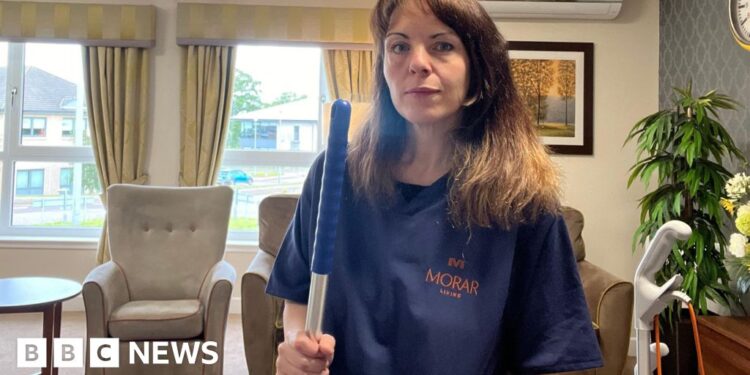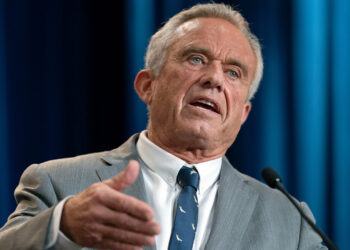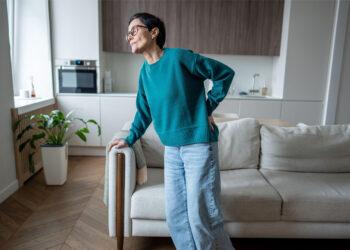Catriona MacPheeBBC Scotland Disclosure
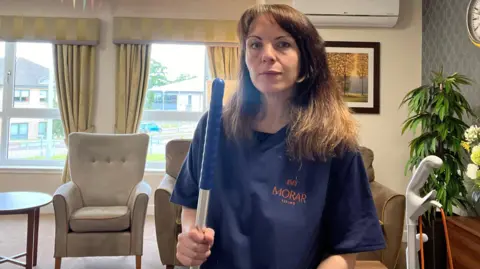 BBC
BBCIn my seven weeks undercover in an overstretched care home I witnessed many scenes of poor care and distress but there was one incident that I suspect will remain with me for a long time.
On the worst days, when staffing was at its lowest levels, the residents would sometimes shout for help as they heard my cleaning trolley rumbling past their rooms.
Some were desperate for help to go to the toilet, others simply wanted to get washed and dressed for the day.
As a cleaner, there was little I could do except offer words of comfort and assurances that I’d told the care staff.
One day I sat with a woman in a nightie who needed help to be taken from her bed to the bathroom, just 8ft away.
Her room echoed with signs of a life well lived – a proud career, foreign holidays with her loving family, an immaculately curated wardrobe of cashmere cardigans.
As we waited for a carer to come, she begged me not to leave.
She was becoming increasingly uncomfortable.
I tried to distract her with small talk about the view and the weather.
She listened until she could no longer hide her distress.
As her physical capacity to wait for the toilet finally crumbled, she began to sob.
I felt sadness many times in the care home but that totally avoidable loss of dignity was the first time I felt anger.
Our investigation was sparked by an interview with Susan Christie, whose father spent two years in Castlehill, the largest care home in Inverness.
It is billed as a luxury home and charges up to £1,800 per week.
But Susan had become so concerned by the standard of her father’s care that she installed a secret camera in his room – and she was appalled by what she saw.
“He wasn’t being washed properly, he was being left in an incontinence pad for in excess of 12 hours, never taken to the toilet, food placed out of reach, spilling hot porridge on himself,” she told us.
“It was neglect.”
The final straw came when a cleaner was filmed restraining the elderly man and violently shaking the bed frame before prodding him with a walking stick.
He was later sacked and Susan had nine complaints upheld by the Care Inspectorate.
She moved her father out of Castlehill in May.
In order to compare Castlehill to the 1,000 other care homes across Scotland, the BBC sent a Freedom of Information request to sector regulator, the Care Inspectorate, to ask which care homes in Scotland had the most complaints upheld against them.
Castlehill topped the list with 10 complaints upheld in 2024.
We interviewed a further four families who all had stories of similar concerns – but they were all historical.
The only way to judge whether this was still going on was to go in and see for ourselves.
We went through the rigorous BBC internal processes of asking for permission to secretly film.
There was judged to be a significant public interest in evidence-gathering of this nature.
In May I found myself phoning the care home to ask if there were any cleaning jobs going.
I was invited for an interview and asked to start immediately.
At the same time, the home was in special measures due to improvement notices issued by the Care Inspectorate over a range of issues.
They were under the spotlight – surely things would improve?
What I found was an understaffed home that didn’t have the right mix of staff to deal with the basic needs of residents, particularly those with dementia.
This was leading to distress, aggressive behaviour and crisis situations.
As I wheeled my cleaning trolley round the corridors, I was acutely aware of pleading faces peering out of bedrooms, hoping for a few minutes of company and conversation.
Those people, at least, still hoped for a moment of human connection. I came to realise others had given up.
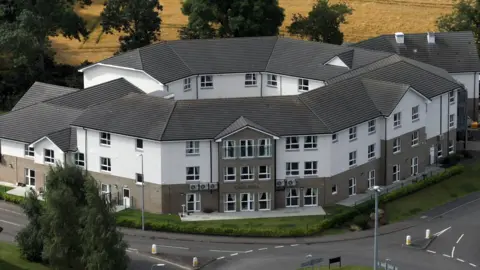
One day I reassured a man who needed the toilet: “I’ve told the carers, they say they’re coming.”
“Aye, so is Christmas,” he replied.
Of all the things I tried to prepare for before going undercover I hadn’t anticipated forming genuine bonds with the people who lived in there.
The reality of this hit me one day while I sat in my car on a break and I was overwhelmed with emotion.
Earlier, while cleaning one resident’s room, I found myself retching because of the smell, unable to stay for longer than 20 seconds.
The once-proud Highland gentleman whose room it was had been served his breakfast and had spent hours sitting alone in there.
Nobody had thought to open his curtains or windows.
At least I could walk out of there at the end of my shift. They couldn’t.
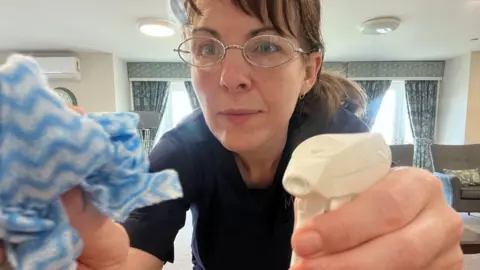
During my time in the home, I often found residents lying in wet clothes or on soiled sheets.
I heard women screaming from behind closed doors because male carers were doing their intimate care.
The impact of overstretched staff was clear.
They had had a tick list of tasks to complete and often that was too long to include meaningful engagement, support with eating or unhurried continence care.
There were some carers who strove to make the lives of residents better and who managed to carve out time in their busy days to engage but those moments were few and far between.
Carers were paid £13 an hour to do intimate personal care, and much more, for people with very complex needs. This is in line with industry standards.
I interviewed Donald McAskill of Scottish Care for the BBC Disclosure investigation.
One of his quotes has stuck with me.
“You can get more for walking a dog through the meadows of Edinburgh than you can from sitting at somebody’s bedside, holding their hand as they breathe their last,” he said.
“For me, I find that obscene.”
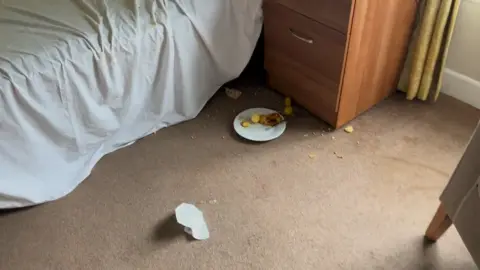
The experts we interviewed were unanimous on one issue. They said the care sector is in crisis.
They cited underfunding, staff shortages and unprecedented cuts to frontline dementia support services.
With a backdrop of rising demand for care – the number of people with dementia is predicted to double by 2040 – all of the expert contributors in our film called for a nationwide conversation on the future of the sector.
Families often told me that they had no option but to place their loved ones in a care home.
It hadn’t really been a choice, it was the result of a crisis or a lack of care support at home.
The guilt weighed heavily on them, as did the burden of the complex financial arrangements that come with care homes.
It’s a situation that has, or will, touch most families at some point.
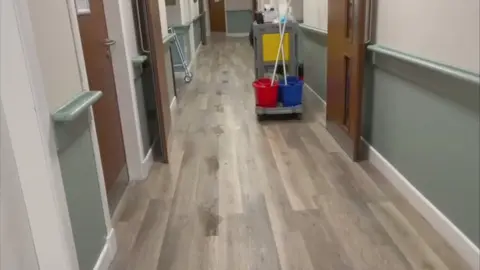
The job was not all doom and gloom.
In my final week, a new activity leader began staging music concerts and playing the mandolin in the lounges, to the great joy of some residents.
A new deputy manager also set her mind to the task of tackling the smell of urine that permeated the first floor.
The residents were the unexpected highlight who kept me going when I found it hard to keep walking back through the front doors of Castlehill.
One man stopped me in the corridor to tell me about his volunteering work and how much he enjoyed this time helping others.
As we laughed about the situations he’d found himself in, he suddenly cut the conversation short.
He said his bus was due any minute and he didn’t want to miss it.
It dawned on me that he thought we were two strangers chatting at the bus stop.
Despite that not being the case, we both took joy from that human connection.
I learned that with a few minutes of your time, you could encourage someone out of their shell or ease their confusion.
That was all it took for them to walk away with a smile, or at least calmer than when they first approached you.
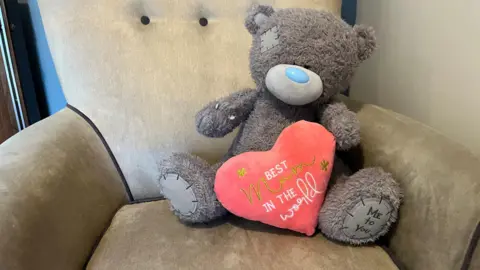
When I worked in the home I wore a secret camera, which was recording for most of the time.
I worried that someone might spot the hidden lens, or the battery would fall out of my clothes.
Luckily neither of those things happened.
On one occasion I forgot to wear the fake glasses I had adopted as a partial disguise.
I’m from the Highlands and was worried that someone from my home town would come into the home and recognise me, so the disguise gave me a small reassurance.
Half way through a staff meeting, someone asked how I could see properly without my glasses on today?
I bumbled my way through an explanation of not having had my coffee yet and leaving them in the car by mistake. It was a sloppy mistake that I didn’t repeat.
There were days when the camera failed, or the battery ran out.
There were other days when I had to help the residents first and foremost, and was not able to switch the camera on.
I was clear on one thing from the outset – my priority had to be the residents and their needs.
That was the whole point of the investigation. Filming was secondary.
There were some incidents of poor care that I did not record on camera but I left with a clear conscience.
It was a privilege of this role to briefly cross paths with interesting, funny and charming characters, who led rich and colourful lives.
We sang songs together, danced in the corridor, hugged, discussed all manner of topics – from Caravaggio and Gaelic lessons to Donald Trump and dog walking – and laughed, lots.
Without realising it, the residents kept me going through a difficult job.
I left Castlehill Care Home on 9 August.
As I walked out the doors for the final time, one question repeated in my mind – surely they deserve better?
‘Significant improvements made in the last three months’
A spokesperson for Castlehill Care Home, which trades under the name Simply Inverness, said: “We are appalled by the footage aired in the BBC programme.
“It was not provided to us in advance and does not reflect the situation today.
“The safety, health and wellbeing of residents remains our absolute priority at all times.
“The Care Inspectorate has recognised the significant improvements made in the last three months.
“We must ensure that these improvements are sustained.
“In excess of £1m is being invested in the refurbishment of the home and we thank all residents and their families for their patience during the renovations.”
A spokesperson for the Highland Health and Social Care Partnership said: “The content of the BBC Disclosure documentary about Castlehill Care Home which highlighted issues about delivery of safe, quality care was concerning for all to see, and we understand how deeply distressing this will have been for families of those residents.
“We have a responsibility as a key partner with regards to support and protection of adults and we have clear expectations of standards to be met by any care home provider in Highland.
“The provider of Castlehill care home did not meet those standards.
“At this time care home admissions remain suspended and will continue until we are absolutely confident that the required standards have been met and sustained.”
If you have been affected by the issues raised in this story, information and support can be found at the BBC’s Action Line.
Source link : https://www.bbc.com/news/articles/c4g78yj2v2go?at_medium=RSS&at_campaign=rss
Author :
Publish date : 2025-09-30 21:57:00
Copyright for syndicated content belongs to the linked Source.

